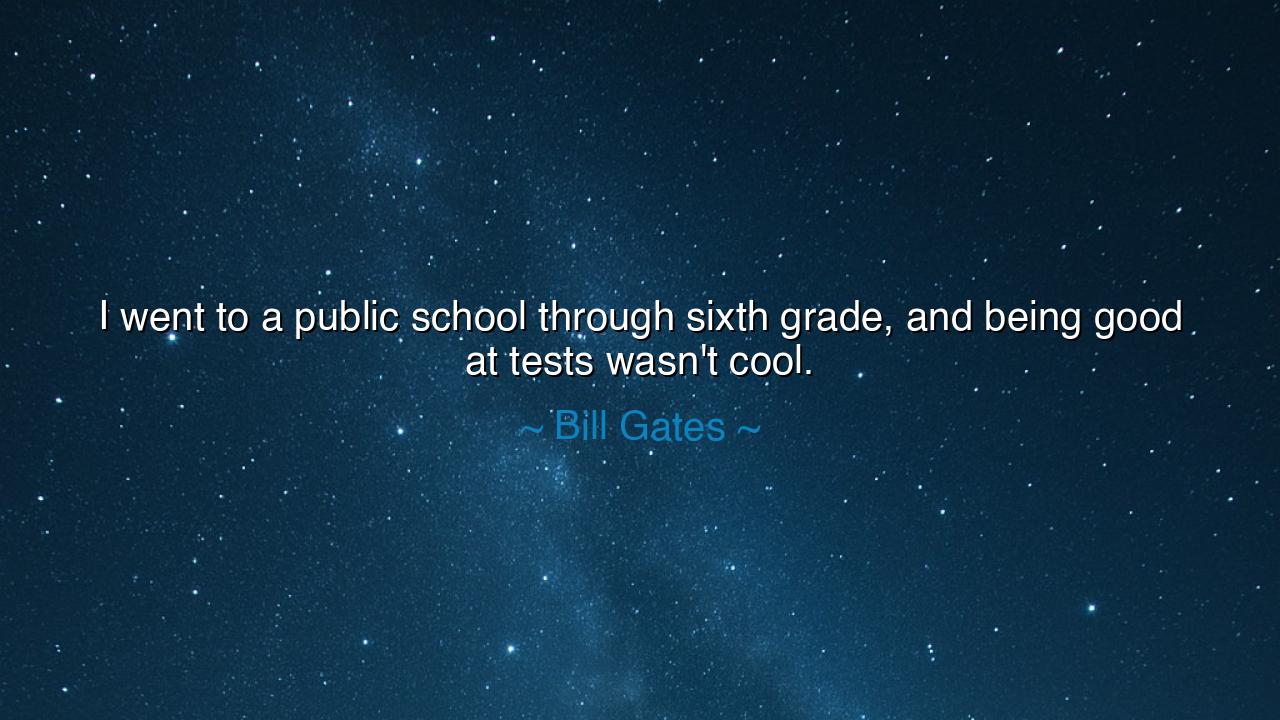
I went to a public school through sixth grade, and being good at






"I went to a public school through sixth grade, and being good at tests wasn't cool." These words, spoken by Bill Gates, offer a candid reflection on the complex relationship between education, social status, and intellectual achievement. Gates' statement underscores the tension that often exists in environments where academic success is not always valued in the same way as other qualities such as popularity, athleticism, or social influence. In his early life, Gates experienced firsthand the discomfort that comes with being academically gifted in a world where being good at tests—an indicator of intelligence—was not considered cool or desirable.
In the ancient world, this conflict between intellectual achievement and social acceptance was a theme that Socrates explored in his dialogues. The great Greek philosopher often found himself at odds with the popular beliefs of his time, advocating for the value of wisdom and reason over the superficial pursuits of wealth, power, and fame. He famously declared that “the unexamined life is not worth living,” suggesting that true worth came not from outward appearances or societal approval, but from the pursuit of knowledge and understanding. Socrates, much like Gates, was not afraid to embrace what was considered uncool—his love for philosophy and intellectual exploration often made him a target for ridicule among the Athenian elites. The tension between intellectualism and social acceptance that Gates speaks of is not new but has been a defining challenge throughout history.
Gates’ experience also mirrors that of Leonardo da Vinci, a polymath whose genius often went unrecognized by his contemporaries. Da Vinci’s brilliance lay not only in his artistic ability but in his unrelenting curiosity and intellectual pursuits, which sometimes led him to neglect the more conventional aspects of social life. In his time, the artist-scientist was often dismissed by those around him as eccentric or out of touch with the norms of society. However, it was through his intellectual rigor that he transformed art, science, and engineering, leaving a legacy that would inspire generations to come. Like Gates, da Vinci’s path was not one of popular approval, but one of personal dedication to the development of his craft and mind.
The fact that Gates, as a young student, found being good at tests to be "uncool" speaks to the pressure society places on individuals to conform to certain social expectations, especially in adolescence. The desire to fit in, to be part of a group, often outweighs the pursuit of individual achievement. This is a challenge that many students face today: the tension between excelling in academics and being perceived as socially acceptable. Gates’ honesty about his own struggles shows that even those destined for greatness can face such pressures, and it reminds us that success in one area—such as being academically gifted—can sometimes lead to alienation in social circles that prioritize other qualities.
This dynamic also highlights a critical aspect of education: the need for nurturing environments where intellectual curiosity and academic achievement are celebrated rather than undervalued. The ancient Greeks placed great emphasis on education as the foundation of a just society. They believed that through the pursuit of knowledge, individuals could contribute to the common good. Similarly, we must encourage students to embrace learning for its own sake and not allow societal pressures to dictate their worth. Gates' reflection on his school years challenges us to rethink the way we value intellectualism in society and how we can create a culture where academic achievement is seen as cool and worthy of praise.
The lesson from Gates' quote is clear: intellectual achievement and academic excellence should not be stigmatized or deemed uncool. Society must evolve to recognize the value of education and the pursuit of knowledge. Gates’ own life exemplifies the reward that comes from pursuing one’s passion, even when it might not be immediately appreciated. His dedication to technology and innovation has reshaped the world in countless ways, proving that the true measure of coolness lies in the impact we make through our skills, intellect, and contributions to society.
In practical terms, this means we must foster an environment that values learning and creativity in all its forms. Schools and communities should celebrate the individuality of those who excel in academics, ensuring that intellectual gifts are not diminished by the prevailing social norms. Encouraging students to embrace their strengths without fear of being judged or alienated is key to creating a more inclusive society where diverse talents are acknowledged and respected. Moreover, we must instill in young people the understanding that knowledge is power, and that coolness is not defined by conformity, but by integrity, innovation, and purpose.
Finally, let us remember that the true value of an individual is not defined by how they are perceived by others, but by their dedication to their pursuits, their passion for learning, and their commitment to contributing to the world. Just as Socrates was revered for his unwavering pursuit of knowledge, and da Vinci for his boundless curiosity, so too can we find greatness in our own academic and intellectual journeys. Let us encourage the next generation to embrace their academic gifts, knowing that the true value of their work will be recognized by history, not in fleeting trends or social approval, but in the lasting impact they leave behind.






AAdministratorAdministrator
Welcome, honored guests. Please leave a comment, we will respond soon